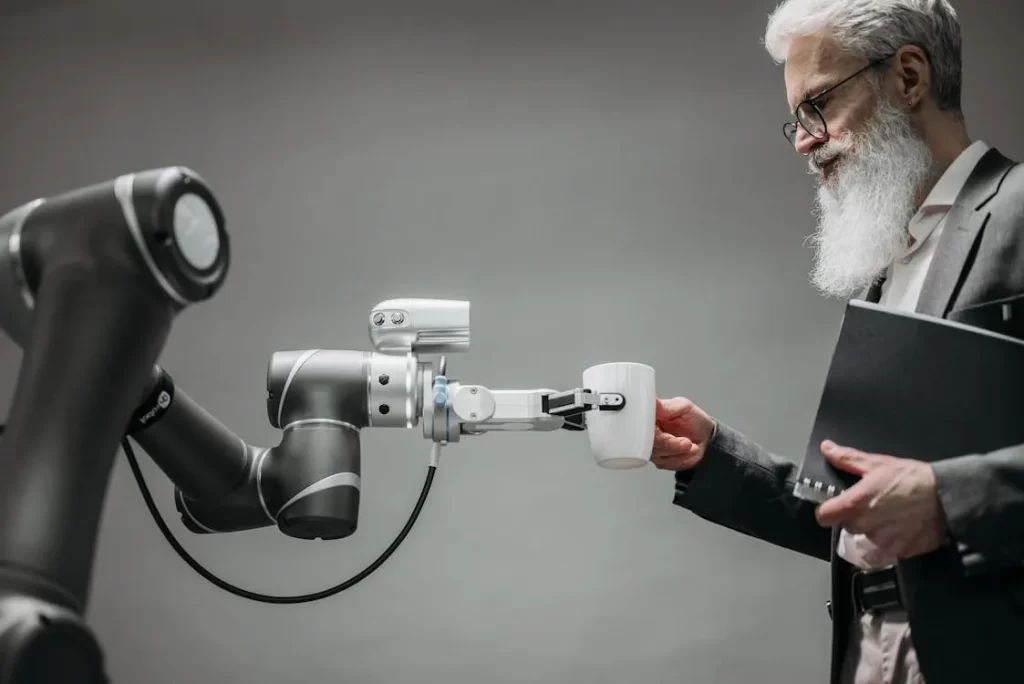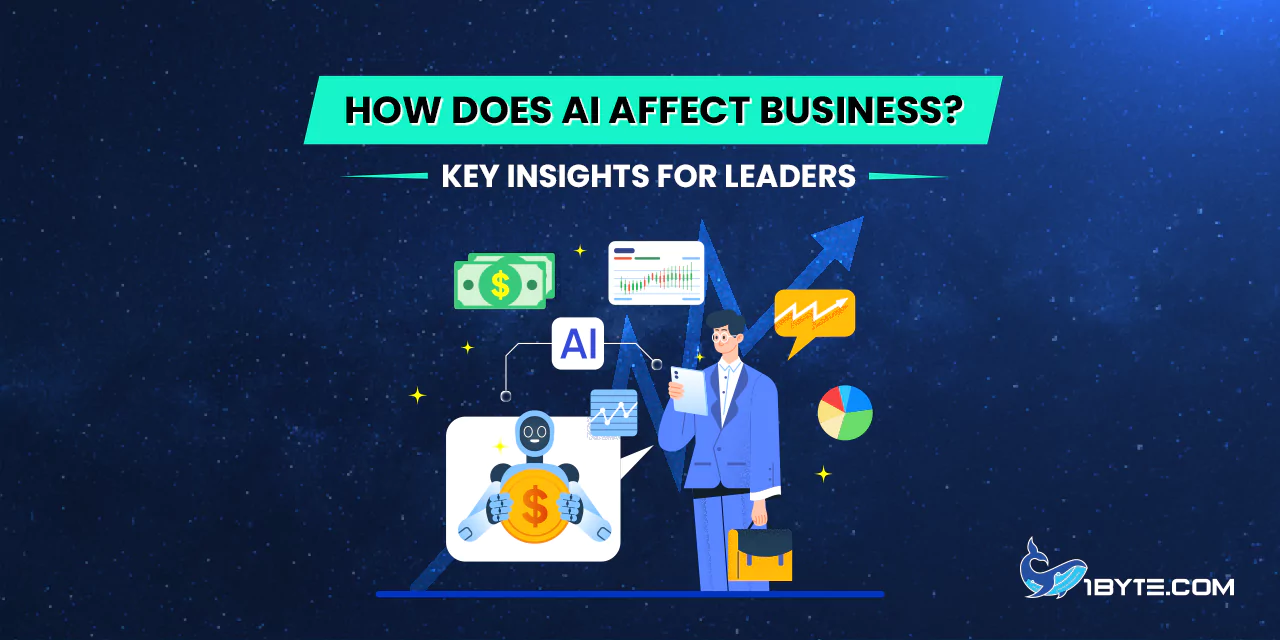In 2025, Artificial intelligence (AI) is shaping business operations. The question “how does AI affect business” is now central to strategic planning. In fact, a recent data shows that 78 percent of organizations that use AI at least in one business function (up from 55 percent in 2023 ).
AI aids in better efficiency because they automate routine tasks. Some of those include Deloitte’s inhouse AI chatbot, PairD, which is already used monthly by nearly 75% of the firm’s UK audit staff, a number that jumped from 25% the previous year .
In logistics, AI serves Uber Freight in optimizing routes for trucks and consequently decreases empty miles by 10–15% and boosts operational efficiency .
AI also improves customer service. 80% of customer inquiries (e.g. returns, inventory …) are handled by Walmart’s AI chatbots.
Moreover, AI aids in decision-making. For instance, companies such as Mattel use the AI tool to analyse the customer feedback and to develop the products better.
The examples here showcase that AI can be used to improve business efficiency, customer service, and strategic decision making. Read this article from 1Byte to find out more.
Automation of Repetitive Tasks
Businesses are transforming routine tasks using artificial intelligence or AI. Through automated repetitive processes, companies can increase efficiency among all levels of operations, while lowering operational costs. Understanding how does AI affect business in this context is crucial for leaders aiming to stay competitive.
Uber Freight, an AI based player in the logistics sector is making truck routing more optimal. According to him, this approach has resulted in a 10–15% decrease of empty miles, which addresses inefficiencies and reduces fuel consumption.

Deloitte has begun to aggressively expand the use of its AI chatbot, PairD, in professional services, specifically in the audit staff in the UK. Almost 75% of auditors are using the tool monthly, or more, a figure that has tripled since our adoption rate. What PairD does is that it supports tasks related to summarising the data , coding and conducting research that can otherwise make your audit process more efficient .
Chef Robotics’ use of AI powered robots for food preparation and packing in the food industry is also worth noting. They have been able to produce more than 44 million food servings, giving life to the scalability of applying AI to cope with repetitive tasks .
Furthermore, the effect of AI on business is also visible in customer service. AI chatbots used by Walmart can manage up to 80% of customer queries, such as returns and inventory, which is beneficial for the customer experience and relieves the work load on the human staff .
These examples illustrate how AI affects business by enabling smarter decision-making through data analysis. By leveraging AI, companies can enhance efficiency, reduce costs, and respond swiftly to market changes.
Smarter Decision-Making with Data
In business decision making, artificial intelligence (AI) improves business by finding patterns and trends from large datasets. Companies can make informed and timely decisions because of this capability. Understanding how does AI affect business in this context is crucial for leaders aiming to leverage data effectively.
For instance, Amazon has incorporated generative AI into its finance works to accomplish tasks such as fraud detection, contract review and financial forecasting. The intention of this integration is to increase accuracy and productivity in the finance team .
In the case of Coles, the retail giant applies AI and machine learning to forecast demand for liquor in the retail sector. The system analyzes the data collected from events, weather patterns, promotions and past sales and improves the supply chain efficiency and maintains enough stock for big events .
In the logistics industry as well, it is also clear that AI plays a role in decision making. AI in Uber Freight optimizes truck routing and eliminates 10–15% of the empty miles. The cost savings and improved operational efficiency result in optimization in this case.
Personalization at Scale
Businesses are using artificial intelligence (AI) to transform how they create personal customer experiences. Thanks to giant data analysis, AI allows businesses to adapt their interaction with the clients according to their preferences, thus increasing engagement and loyalty. Understanding how does AI affect business in this context is crucial for leaders aiming to stay competitive.
AI is recognized by a bulk of businesses as a personalization enabler. A Twilio/Segment report mentions that over 92% of companies are using AI-driven personalization to grow . Its widespread adoption is proof of AI’s application in business strategy.
A good example for this trend is Amazon who put AI to use across all a number of customer touchpoints. Specifically, the company is developing over 1,000 AI applications that are designed to improve shopping experiences, personal assistants and media streaming services . The extent of the application of AI in this case, simply proves its potential to redefine customer engagement.
Similarly, Microsoft has also upgraded its AI assistant, Copilot, so that it can serve as a personal shopping assistant. Features such as price monitoring, product comparisons, tailormade recommendations, are all now available with Copilot to make online shopping as easy as it can be. The development shows the impact of AI on business by having a positive impact on the consumer journey.
Most recently, Alibaba has deployed AI generated items (AIGI) in e-commerce to personalize the product offering. Alibaba generates photorealistic images from textual descriptions in order for customers to pre-order unordered products before production, decreasing waste and keeping products lined up with customer preferences. This is an example of AI at scale, that is AI capable of customization.
The above examples point out how AI is instrumental in aiding business in personalisation at scale. Using AI technologies, companies can give tailormade experiences which satisfy specific needs of an individual customer and contributes to the satisfaction and growth of a company.
Cost Savings and Efficiency Gains
With considerable reduction in costs and improvement of efficiency, the art of artificial intelligence (AI) is revolutionising the way businesses operate. Therefore, it is vital that leaders try to understand how does AI affect business for optimizing operations and also retain their business competitive advantage.
In a 2025 report, ISG suggested that AI powered automation and predictive analytics can improve business processes in ways never possible before to cut costs and at the same time retain or even improve operational capability.
For instance, Uber Freight uses AI to control truck routings, trimming 10–15 percent empty miles and, accordingly, monetary fuel expenses and enhanced practical productivity.
And in the financial sector, JPMorgan Chase has said that its software engineers are able to be 20% more productive using the AI coding tool, freeing them to work on more high value projects.
Also, the consulting industry is impacted by artificial intelligence (AI). For instance, major firms such as Grant Thornton and EY have incorporated AI systems in order to make their tasks less time consuming for their employees as they now save 7.5 hours a week on average and enhance their overall efficiency by 20%.
These are some examples of how AI affects business by helping save costs and efficiency in different parts of the business. With AI technology ever growing, it is on track to perform an even bigger role in streamlining and reducing expenses of operations.
Challenges Business Leaders Must Consider

However, artificial intelligence integration into its operation creates several problems. Artificial intelligence (AI) provides many benefits, but there are some problems with artificial intelligence integration in business operations. However, addressing these obstacles proactively forms the only way to understand how does AI affect business.
1. Workforce Displacement and Morale
Employees are worried of being displaced in favor of jobs that can be automated by AI. For example, the CEO of Shopify mandated that all managers must justify use of resources by proving that AI cannot perform the job better, a core expectation of integration with AI to all employees. Such policies can also change employee morale and job security.
2. Data Privacy and Security Concerns
The adoption of AI raises significant data privacy and security issues. According to a McKinsey report, around half of employees are concerned about inaccuracies on the part of AI and cybersecurity threats. These concerns need to be mitigated by ensuring robust data governance.
3. Integration with Existing Systems
Introducing AI into the current infrastructure of existing businesses can be challenging. Costly integration issues, operational disruptions and many companies are running on legacy systems that were not designed with AI demands in mind.
4. Ethical and Governance Challenges
Implementing AI in the right way necessitates clearly and consciously defined ethical policies and bodies for governance. In their report on inconsistent AI governance, PwC links it with risks, which show the importance of governing AI policies.
5. Market Stability Risks
AI models that traders use have broad variants across many people, and if the majority of traders use the same model, it might endanger market stability. The Bank of England warns that the use of AI for trading strategies can induce traders to herd, and suggests that reliance on these strategies will grow herd behavior and amplify market shocks.
These problems need to be solved so business leaders can make the most out of AI’s true promise. Managing these issues proactively would allow companies to understand what is the impact of AI on business and how to deal with the intricacies of AI integration.
Leverage 1Byte’s strong cloud computing expertise to boost your business in a big way
1Byte provides complete domain registration services that include dedicated support staff, educated customer care, reasonable costs, as well as a domain price search tool.
Elevate your online security with 1Byte's SSL Service. Unparalleled protection, seamless integration, and peace of mind for your digital journey.
No matter the cloud server package you pick, you can rely on 1Byte for dependability, privacy, security, and a stress-free experience that is essential for successful businesses.
Choosing us as your shared hosting provider allows you to get excellent value for your money while enjoying the same level of quality and functionality as more expensive options.
Through highly flexible programs, 1Byte's cutting-edge cloud hosting gives great solutions to small and medium-sized businesses faster, more securely, and at reduced costs.
Stay ahead of the competition with 1Byte's innovative WordPress hosting services. Our feature-rich plans and unmatched reliability ensure your website stands out and delivers an unforgettable user experience.
As an official AWS Partner, one of our primary responsibilities is to assist businesses in modernizing their operations and make the most of their journeys to the cloud with AWS.
Conclusion
The year of 2025 is marked by fundamental business operations transformation by artificial intelligence (AI). Understanding how does AI affect business is important for business leaders that want to utilize its full potential.
The examples in this article show how AI is affecting business in terms of improving productivity, decision making, and customer engagement. With AI tech still in its growing stages, it even has the potential to further its position in aiding out operations and innovation.

